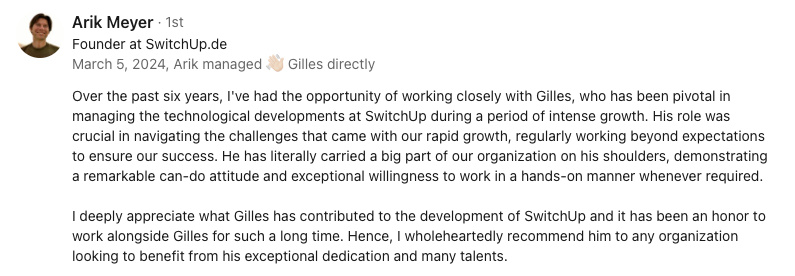Abstract:
The article explores how micro-credentials can empower tech startups to remain competitive and innovative in a fast-paced industry. By offering focused, targeted training, these credentials help startups quickly adapt to new trends and embed innovation as a core competency. They enhance creativity and teamwork by fostering cross-disciplinary collaboration and equipping employees with skills like design thinking and agile methodologies. Real-world examples from European startups illustrate how micro-credentials can lead to rapid product development and market differentiation. The article highlights the strategic advantages of integrating micro-credentials with business goals, such as attracting talent and investment, and emphasizes the importance of aligning these training initiatives with company objectives to enhance competitiveness. Practical guidance for executives on implementing micro-credentials includes conducting skill gap analyses, forming partnerships with educational institutions, and overcoming challenges related to recognition and standardization. By embedding a culture of continuous learning, startups can position themselves as industry leaders and maintain an innovative edge in a dynamic digital world.
Navigating the startup world, especially in tech, is like riding a fast-paced rollercoaster. Change is constant, and competition is fierce. Why do some startups lead the pack, while others lag behind? Often, it's because they adapt quickly to new trends. That's where micro-credentials come into play, equipping startups with the skills needed to turn challenges into opportunities. Let's explore how micro-credentials can boost creativity and teamwork, setting the stage for growth.
Innovation as a Core Competency in Startups
For tech startups, staying innovative is key to remaining competitive. Micro-credentials offer focused training that matches the tech industry's fast pace.
The Strategic Role of Innovation
Innovation is crucial for tech startups. Micro-credentials help embed innovation as a core part of their operations. These credentials focus on developing specific skills that keep teams at the cutting edge. From my experience working with a European tech startup, integrating innovation through continuous learning was vital. We implemented a micro-credential program that systematically introduced necessary skills, keeping us relevant and competitive. This structured learning significantly boosted our company's innovative abilities.
Agility Through Targeted Skill Development
Micro-credentials offer learning opportunities that keep startups agile. For example, when employees update their skills in line with new trends, startups can quickly adapt to market changes. Real-world cases show startups using these credentials to stay ahead. With continuous learning, teams can respond swiftly to tech demands or adjust their strategies based on market shifts. Micro-credentials foster adaptability and innovation.
Highlighting Real-World Examples
Micro-credentials have real benefits, as shown by successful European tech startups. One startup used them to upskill workers, leading to quick innovation and product launches. Such examples demonstrate how integrating focused learning can boost a company's innovative output and set it apart. These successes pave the way for more case studies on how startups have thrived by using micro-credentials strategically.
Enhancing Creative Problem-Solving with Micro-Credentials
In tech startups, creative problem-solving is vital for innovation. Micro-credentials help fill skill gaps, providing employees with the tools to tackle challenges creatively.
Targeted Skill Acquisition
Micro-credentials offer training in skills like design thinking, crucial for solving complex problems. Design thinking involves understanding users, defining issues, and testing solutions. It's especially useful in tech startups, where innovation is key. Courses and workshops develop this mindset, turning challenges into innovation opportunities. Beyond design thinking, agile methods are important for a responsive work environment. Micro-credentials in agile management help teams adapt quickly, which is essential in tech. Real-world examples show agile-trained teams pivoting successfully in market shifts, maintaining innovation.
Cross-disciplinary collaboration is another benefit of targeted learning. By gaining skills across fields, employees work better together, leading to innovative solutions. When team members from different areas collaborate, they bring unique insights that spark fresh ideas. Such environments encourage creativity and challenge the norm.
Practical Application of Skills
Design thinking skills from micro-credentials drive innovative product development. These skills help startups turn user needs into products, increasing customer satisfaction. Teams can prototype and test ideas rapidly, aligning products with user needs. This approach minimizes risk and boosts creativity, helping startups launch successful products in competitive markets.
Agile methodologies also improve team dynamics and project outcomes. Teams trained in agile principles through micro-credentials adjust quickly to project changes, fostering continuous innovation. Agile frameworks like Scrum break projects into tasks, leading to efficient workflows and better quality. This adaptability speeds up project delivery and enhances team innovation.
Cross-functional teams using micro-credentials solve problems more effectively. By leveraging diverse skills, teams address challenges from various angles, creating holistic solutions. For instance, when development, marketing, and design collaborate, their combined expertise results in technically sound and market-ready products. These synergies create a learning culture crucial for ongoing startup innovation.
Encouraging Cooperative Dynamics with Micro-Credentials
In tech startups, micro-credentials promote interdisciplinary collaboration, vital for innovation and efficiency. By equipping employees with varied skills, these credentials encourage a cooperative environment where sharing knowledge is routine.
Cross-Functional Teamwork
Micro-credentials encourage cross-functional teamwork by breaking down department barriers. When team members learn skills from different fields, they collaborate better, leading to innovative solutions and quicker product development. This approach is crucial for startups needing agility and responsiveness. Sharing knowledge and skills across teams improves dynamics, creating a cohesive and innovative environment.
As micro-credentials become part of organizational culture, they foster collaboration and innovation. By valuing learning across disciplines, startups ensure teams truly collaborate, enhancing their ability to innovate. Insights from various fields converge, creating effective solutions and embedding a collaborative culture essential for sustained innovation.
Accelerating Product Development
Micro-credentials boost product development by promoting cooperative synergy. When expertise is pooled from different departments, development cycles shorten, giving startups a competitive edge. This rapid development is a strategic necessity in tech, where being first often means success. By enabling fluid teamwork, startups can innovate and execute ideas swiftly.
In this collaborative setting, sharing expertise becomes second nature, enabling startups to find and apply innovative solutions quickly. This smoother process reduces time to market, allowing faster product development and launch. With agility from micro-credentialing, teams can prototype and iterate ideas rapidly, enhancing development efficiency. The ability to pivot and adapt is invaluable for startups to maintain an innovative edge, capitalizing on market opportunities confidently.
Agile Strategies and Rapid Prototyping in Startups
Facing an ever-changing market, tech startups can benefit from agile strategies supported by micro-credentials to stay flexible and innovative.
Supporting Agile Methodologies
- Micro-credentials offer agile methodology training, helping startups stay competitive by being flexible.
- By teaching agile project management skills, employees can respond quickly to changes, allowing startups to pivot efficiently.
- Agility from micro-credentials keeps startups nimble, continuously adapting strategies to seize new opportunities.
- This flexibility is crucial in a fast-paced tech world, where advancements require businesses to be alert.
With skills honed through micro-credentials, startups can respond rapidly to tech shifts and market changes. A culture of continuous learning equips workforces to handle disruptions smoothly. This rapid response drives innovation, enabling startups to outpace competitors by adopting new technologies and aligning strategies with market demands. Agility transforms challenges into growth opportunities, ensuring relevance in a dynamic digital world.
Enabling Rapid Prototyping
Micro-credentials support rapid prototyping, allowing startups to test and iterate ideas quickly. This efficient skill-building process helps teams turn concepts into products swiftly. By facilitating quick testing and iteration, startups reduce the time from idea to implementation, critical for innovation. The cycle of prototyping, feedback, and iteration enabled by micro-credentials ensures products meet user needs, keeping startups competitive and leading trends.
The iterative process from micro-credentials enhances creative output and innovation. Training in iterative development fosters an innovative environment. Credential-driven learning empowers teams to innovate continuously, adapting to real-world feedback and market conditions. As startups leverage these skills, they differentiate strategically, positioning products to attract market interest and meet customer expectations. Micro-credentials create a culture valuing agility, problem-solving, and rapid innovation, positioning startups as industry leaders.
Strategic Differentiation and Market Positioning
Micro-credentials offer startups a strategic advantage by building a reputation for innovation and expertise, crucial for market differentiation.
Building a Reputation for Innovation
Startups can boost their reputation as innovative leaders by incorporating micro-credentials into their strategy. When aligned with brand goals, these credentials help startups stand out in the marketplace. Certifying specific skills and expertise, micro-credentials enhance a startup's narrative of innovation and foresight, appealing to partners and customers. Real-life examples show that targeted skill acquisition solidifies a startup's standing as an industry authority. In a world where perception affects opportunity, startups can use these credentials to build a unique narrative, demonstrating their capability and commitment to cutting-edge solutions.
Attracting Talent and Investment
Micro-credentials do more than enhance a startup's brand; they attract talent and investment. By fostering a culture of skill development, startups appeal to professionals seeking growth. This commitment to learning improves employee satisfaction and signals investors about the company's dedication to innovation. Aligning education strategies with business goals ensures sustained success. Startups investing in their workforce through micro-credentials cultivate dynamic teams ready to drive the business forward, appealing to investors who value proactive growth.
Aligning Strategies with Business Goals
To unlock micro-credentials' potential, startups must align these strategies with their business goals.
Strategic Alignment Benefits
Connecting micro-credentials with business goals enhances market positioning and competitiveness. This alignment shows commitment to development and innovation, appealing to customers and investors. Aligning talent development with business objectives strengthens the workforce and amplifies a company’s market presence. This approach ensures skills gained through micro-credentials contribute to achieving business targets, creating a cohesive narrative that appeals to stakeholders and positions the company as forward-thinking and adaptable.
Signaling Growth to Investors
Investing in micro-credentials signals to investors a startup's growth and innovation commitment. By showing a proactive approach to skill development, startups enhance investor confidence, demonstrating readiness to meet future challenges with a skilled workforce. Successful investment attraction case studies illustrate this. Startups incorporating micro-credentials into strategic planning effectively convey their value to potential investors, creating a foundation for lasting partnerships and financial backing.
Implementation Insights for Executives
For executives looking to integrate micro-credentialing into their strategies, here's a practical guide for using focused learning paths to boost company growth.
Practical Steps for Integration
Understanding micro-credentialing is the first step toward effective integration into innovation strategies. An informed approach recognizes the range of micro-credentials available and their fit with industry needs. Conducting a skill gap analysis helps identify areas where micro-credentials can fill gaps, tailoring training programs to ensure the right skills are in place. This strategic approach strengthens the workforce and enhances the company's competitive edge.
Forging strategic partnerships with educational institutions amplifies the value and recognition of micro-credentials. Collaborations with reputable universities and platforms ensure the skills acquired are relevant to current market demands. This approach elevates micro-credentials' perceived value and embeds a learning culture, driving innovation forward.
Overcoming Challenges and Best Practices
Leveraging micro-credentialing successfully requires addressing obstacles and adopting best practices. One challenge is the lack of recognition and standardization, which can hinder integration into HR practices. Learning from companies that overcame these hurdles by developing evaluation systems and competency frameworks can be instructive. Aligning micro-credentials with roles and company goals ensures they add tangible value.
Continuous monitoring and iteration are crucial for effective micro-credential programs. Employee feedback assesses training relevance and impact. Implementing improvement models refines programs, aligning them with evolving business objectives and industry trends. An adaptive learning environment maintains an innovative edge, equipping the workforce with skills needed to tackle future challenges.














